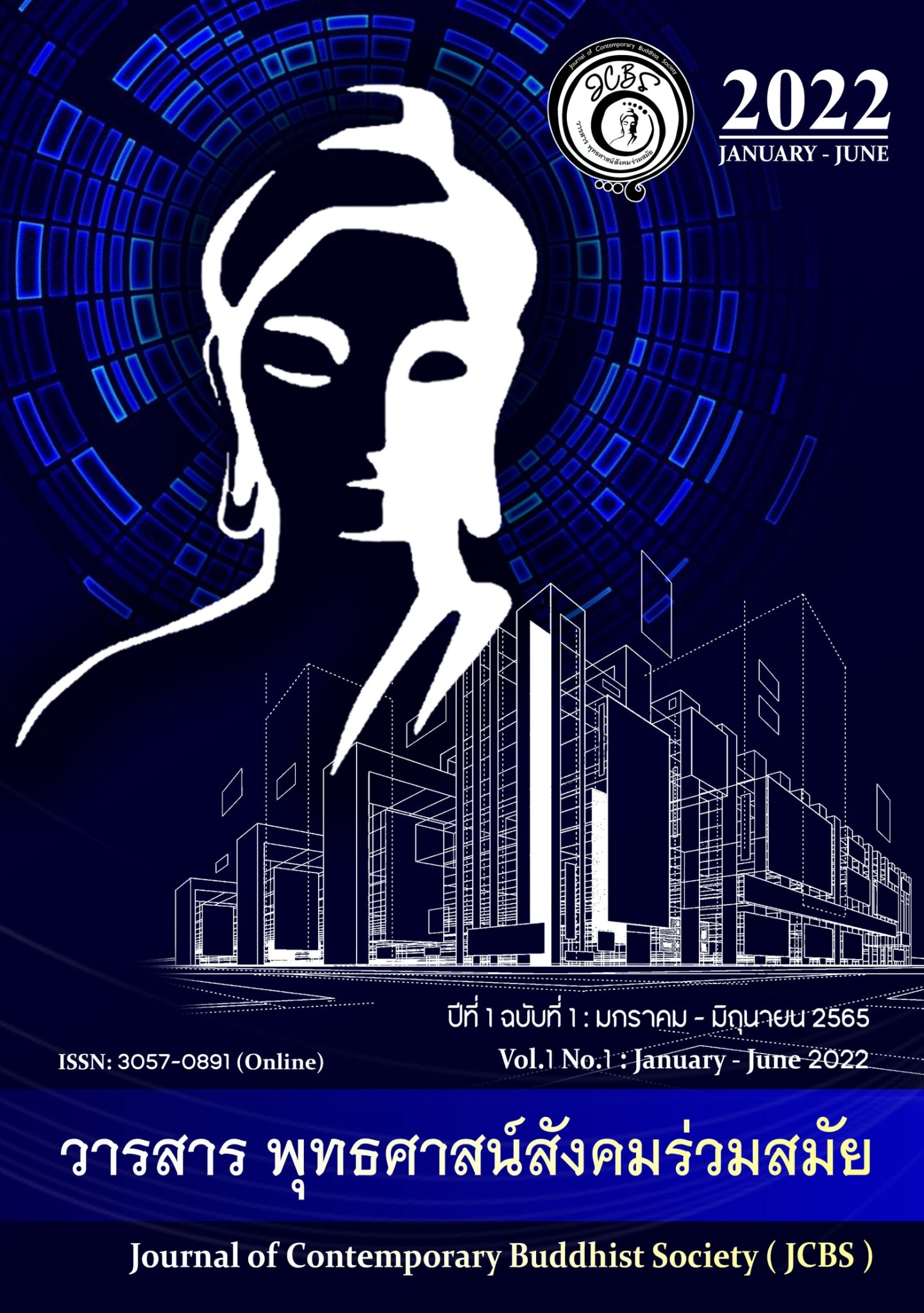LIVING ACCORDING TO BUDDHIST PRINCIPES IN THE NEW NORMAL
Keywords:
New normal, lifestyle, principles of BuddhismAbstract
The way of life that has come across to be changed from one era to another era will inevitably change from the original. People' beliefs or attitudes in the old era won't be able to use in the modern era because the context of the modern society has change from the original. Good change must be maintained the goodness value and improved the past drawback so that it can develop into a good direction in accordance with the new way of life in the present society. Buddhism is an example of goodness that aims for teaching the Buddhists to live in the Dharma's life principle for instance aside from bad things. do good thines. and purify the mind. The Dharma's principle in Buddhism is a universal theory that can be applied for solving the problems in various situations and many change events that may happen in every era. Because even the human body is being constantly transmuted. These are the facts that will happen to everyone. but not everyone will be able to understand and accept these changes. With the right guidance. they will be able to understand and accept the reality because everyone has the same aim in the way of life that is happiness. If there is suffering because of the problems in life. To make it as a normal life will be difficult. Thus: there must be the way for living as a normal life. even when facing with the problems or the unexpected changes. The principle of Buddhism. therefore. is a guide for living in the present era that the change can proceed normally and at last result in the happiness.
References
กรมสุขภาพจิต. (2564), New Normal ชีวิตวิถีใหม่.[ออนไลน์].แหล่ง'งที่ มา: https//www.dmh.go.th/news/view.asp?id=2288.
กรุงเทพธุรกิจ. (2564), New Normol คืออะไร เมื่อโควิด-19 ผลักเราสู่ชีวิต 'ปกติวิถีใหม่'. [ออนไลน์]. แหล่งที่มา: https://www.bangkokbiznews.com/lifestyle/882508.
นภาพัทธ์ งามบุษงโสภิน. มนตรี สิระโรจนานันท์. (2563). "พุทธวิธีเพื่อการดูแลตนเองใน สถานการณ์โควิด 19". วารสารบัณฑิตศึกษาปริทรรศน์. ปีที่ 16 ฉบับที่ 2 (พฤษภาคม-สิงหาคม): 42-48.
พระครูธรรมคุต (สุทธิพจน์) สุทธิวจโน และคณะ. (2564). "การดำรงชีวิตวิถีใหม่ตามแนวพระพุทธศาสนา". วารสารศึกษาศาสตร์ มมร. ปีที่ 9 ฉบับที่ 1 (มกราคม - มิถุนายน): 199-211.
พระพรหมคุณาภรณ์ (ป.อ. ปยุตฺโต). (2546). พจนานุกรมพุทธศาสตร์ ฉบับประมวลธรรม. กรุงเทพมหานคร: สำนักพิมพ์มหาจุฬาลงกรณราชวิทยาลัย.
(2550). พจนานุกรมพุทธศาสตร์ ฉบับประมวลธธรรม. พิมพ์ครั้งที่ 15. กรุงเทพมหานคร: สำนักพิมพ์จันทร์เพ็ญ.
พระศากยวงศ์วิสุทธิ์ (อนิลมาน ธมมสากิโย). (2564). ให้วัดอยู่ในบ้าน โควิดทำวิถีพุทธเปลี่ยน แต่ไม่กระทบ
แก่นธรรม. [ออนไลน์]. แหล่งที่มา: https://workpointtoday.com/vesak-day.
มหาจุฬาลงกรณราชวิทยาลัย. (2539). พระไตรปิฎก ฉบับภาษาไทย. กรุงเทพมหานคร: โรงพิมพ์มหาจุฬาลงกรณราชวิทยาลัย.
สยามรัฐออนไลน์. (2564). วิถีชีวิตใหม่ New Normol. โดยพระมหาโพธิวงศาจารย์. [ออนไลน์]. แหล่งที่มา: https://siamrath.co.th/n/166631.
สอาด ภูนา สรณ์และคณะ. (2564). "พุทธวิถีไทยสู่การพัฒนาที่ยั่งยืนในยุค NEW NORMAL". ". วารสารบัณฑิตศึกษามหาจุหาขอนแก่น. ปีที่ 8 ฉบับที่ 2 (เมษายน- มิถุนายน): 14-26.
สุจิตรา อ่อนค้อม. (2547). การฝึกสมาธิ. พิมพ์ครั้งที่ 8. กรุงเทพมหานคร: ดับเบิ้ลนายน์.
Downloads
Published
How to Cite
Issue
Section
License
Copyright (c) 2024 Journal of Contemporary Buddhist Society = JCBS

This work is licensed under a Creative Commons Attribution-NonCommercial-NoDerivatives 4.0 International License.





